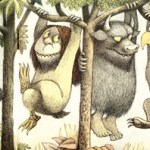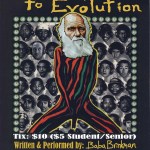Review
Not me guv, but Tom Fuller (just when I'd given up hope he would ever say something sensible). You might say, "well der". But this chimes in very neatly with a not-fully-discussed problem with the Spencer and Braswell error, which Gavin talks about at RC: With better peer review, Spencer could perhaps have discovered these things for himself, and a better and more useful paper might have resulted. By trying to do an end run around his critics, Spencer ended up running into a wall.
Spencer and his ilk are afraid of peer review. Not for the reasons that they give - that the vast conspiracy will…
Just received an email from Vector-Borne and Zoonotic Diseases saying that my recent article, The Emergence of Staphylococcus aureus ST398, will be available for free online for the next two weeks. It was submitted roughly a year ago so it's already a bit dated in this quick-moving field, but provides an overview of "livestock-associated" MRSA up to mid-2010 or so--including food-associated MRSA.
The physics book generating the most bloggy buzz in the latter part of 2010 would have to be Ian Sample's Massive: The Missing Particle that Sparked the Greatest Hunt in Science, about the as yet undetected particle known as the Higgs boson. Detecting the Hiigs is the most immediate goal of the Large Hadron Collider, so it's a topic that's in the air at the moment, so this book was inevitable-- in fact, the publisher sent me not one but two review copies. I gave one away, but that makes me feel even more guilty for taking months to get around to reviewing it.
This is, basically, a concise…
We live in an age where truth is, if not stranger than fiction, then at least equally strange. Sometimes pop-science books illustrate this point with particular well-researched glee and Packing for Mars: The Curious Science of Life in the Void is such a book.
Where do I begin? It's a true nerd's smorgasbord. It answers all the scatological and emotional questions that kids always imprudently ask astronauts. It acknowledges the humanness of space travel as a venture: that astronauts are people who must eat, pass gas, have sex, take up space, sweat, sleep, fear, and otherwise learn to be…
I finished Jennifer Ouellette's new book a few weeks ago, shortly after my trip to Alabama, but it's taken me a long time to get around to reviewing it due to a combination of too much work and being a Bad Person. There's finally a tiny break in the storm of work, though, so here's a slightly belated review.
The Calculus Diaries is not a book that will teach you how to do math. There aren't worked examples, detailed derivations, or homework problems in the main text. It might, however, teach you not to fear math, as it provides a witty and accessible explanation of the key concepts behind…
We haven't yet gotten to the point where we're comfortable leaving SteelyKid with a babysitter, so seeing the movie everybody's talking about took a while. Since she's off at Gammy's, though, we got a rare night to ourselves and went to the movies.
My immediate reaction is that it's great to see a movie that's kind of smart and not based on anything dominating the box office. If this helps break us out of the endless cycle of re-makes and comic-book movies, I'll be as happy as anyone.
This is an extremely well-done movie, with everything shot, acted, and choreographed very well. There was…
I have now finished all of the short fiction on this year's Hugo Award ballot (links to most nominees are available here), and I have to say, the pickings here are pretty slim. The stories that aren't forgettable or preachy are deeply unpleasant, leaving me wanting to put a lot of stuff below "No Award." And there's one story that makes me want to bleach my frontal cortex.
More detailed comments, category-by-category, below the fold:
Best Novella
“Act One”, Nancy Kress (Asimov’s 3/09)
The God Engines, John Scalzi (Subterranean)
“Palimpsest”, Charles Stross (Wireless; Ace, Orbit)
Shambling…
Author's Note: The following is an excerpt from my review of Sex At Dawn: The Prehistoric Origins of Modern Sexuality. For additional information see my posts Reexamining Ardipithecus ramidus in Light of Human Origins, Those Cheating Testicles, or Who's Your Baby? as well as Helen's Lament and the Origins of Forbidden Love. Christopher Ryan also blogs at Psychology Today.
When we think of the first swinger parties most of us imagine 1970s counter-culture, we don't picture Top Gun fighter pilots in World War II. Yet, according to researchers Joan and Dwight Dixon, it was on military bases…
When most people think of evolutionary biology the first thing that comes to mind probably isn't lyrical poetry. However one of the earliest proponents of evolution, none other than Charles Darwin's grandfather Erasmus, presented his vision for the origin of life in the form of an epic poem in 1803. In his critically acclaimed work The Temple of Nature Darwin mused on the natural history of human beings:
Imperious man, who rules the bestial crowd,
Of language, reason, and reflection proud,
With brow erect who scorns this earthly sod,
And styles himself the image of his God;
Arose from…
Last week I joined Brendon Connelly and Colin Murphy of the Pulse Project Podcast to discuss some of the week's science stories and chat about zombies, blogging and the origins of SciencePunk. Among the highlights are the sheer PR audacity of teaching an dolphin to communicate using an iPad and a guy who takes x-ray images of big things and alters them to fit the way we think the world should look in the x-ray spectrum. Safe to say it's an aural geekout!
You can follow the Pulse Project on Twitter and join them on Facebook. The organisation aims to "reflect and inform debates amongst…
I'm going to make an argument that you should buy an Apple iPad despite widespread rumors of hardware problems and despite widespread criticisms of its design as funky and flawed.
And by "you" I mean yooz guyz who are skeptics.
In order to get there, to the point of this argument, I'm going to have to define skeptical computing, and to do that, skeptical anything, and to do that, what being a skeptic is. That sounds like a long journey but I promise to be concise.
What is a skeptic? A skeptic is a person (or other sentient, symbolically thinking being) with the ability to make rational…
After a brief insurrection by their blue collar offspring, zombies, vampires have once more regained their prominence as the monster supreme, leaping out at us from every bookshelf, cinema screen and TV set. What better time then for Mark Jenkins to unleash his accomplished study of the bloodsucker legend, Vampire Forensics.
Published through National Geographic Books and accompanied by a television documentary, Vampire Forensics delves into the long history of the vampire, one which began millennia before a certain Bram Stoker set pen to parchment. Drawing upon the latest research in…
In light of the Oscars this Sunday I thought those of you who missed it would enjoy my review of District 9 (which is up for four Academy Awards including Best Picture and Best Adapted Screenplay).
Inexplicably, a UFO appears over one of Earth's remote cities. Hovering a few hundred meters above the terrified citizens, a government mission to board the craft is executed only to find the strange beings living in disease and desperation. A decision is made to save their lives and relocate the aliens to the city's outskirts. In that moment, what seemed to be a compassionate action develops…
On Tuesday, Feb. 23, National Geographic Explorer will be devoting an episode to "Vampire Forensics." You can preview a brief clip below the fold, but I'll warn you now: it's not CSI. It's more scientific ("unfortunately this evidence is inconclusive" LOL) and less sexy (inexplicably, Emily Proctor is nowhere to be seen). Overall, the feeling I got from the clip was sort of "Wow, we're National Geographic Explorer, that's pretty great, but we really wish we were sexy, like CSI. Does this sinister music help?"
In conjunction with the Explorer episode, National Geographic is releasing a book…
My favorite novelist, Kurt Vonnegut, once complained about the treatment of science fiction by critics in his book Wampa, Foma and Granfalloons:
I have been a soreheaded occupant of a file drawer labeled 'science fiction' ever since [publishing Player Piano], and I would like out, particularly since so many serious critics regularly mistake the drawer for a urinal.
Science fiction films have often received the same treatment. However, two of the surprise nominees for Best Picture this year are none other than James Cameron's Avatar and the South African alien apartheid action film District 9…
This past weekend I was in Durham, North Carolina (my old stomping grounds) attending the annual ScienceOnline Conference that focuses on science communication in the digital age. I am pleased to report that Anton and Bora have built on their previous successes to accomplish something rare for a conference: it was both relevant and refreshingly innovative.
In the next few posts I will highlight some of the workshops I attended and what the important message I got from the panelists involved:
1. From Blog to Book: Using Blogs and Social Networks to Develop Your Professional Writing (…
Reciprocity is an intrinsic feature of human beings as well as most species of ape. Chimpanzees and bonobos regularly engage in granting gifts of food and expect a return on their generosity (those who don't reciprocate are less likely to receive such gifts in the future) (de Waal and Brosnan 2006). This "tit-for-tat" basis of exchange exists in all human societies and becomes ritualized based on the cultural norms that are present. One of the most well known descriptions of reciprocity among indigenous societies is that of the Kula among the Trobriand Islanders near Papua New Guinea that…
As Jawaharlal Nehru wrote of his native land but as a stranger in the process of discovery, "India is a geographical and economic entity, a cultural unity amidst diversity, a bundle of contradictions held together by invisible threads." These invisible threads were the spiritual beliefs of the people, the Vedas, the Bhagavad Gita and the Manu Smriti. The sacred Ganges was a symbol of India's life blood, as much for the Indian people as for the British colonialists, that, as Rudyard Kipling described in his story "The Bridge Builders," was a natural force that needed to be conquered if the…
Aldous Huxley wrote in his Collected Essays that, "Most ignorance is vincible ignorance. We don't know because we don't want to know." In Plants and Empire: Colonial Bioprospecting in the Atlantic World, Stanford historian Londa Schiebinger highlights the role that such intentional ignorance played in the dissemination of knowledge (and the lack thereof). Whether this ignorance is of local plants and languages--because of the early scientific tradition of naming species only after revered European naturalists--or whether it is of the abortifacients that women would use to terminate an…
Christmas greeting card, school unknown, circa 1920.
Dittrick Medical History Center
from Dissection: Photographs of a Rite of Passage in American Medicine 1880-1930
Slate has an intriguing new review by Barron Lerner of a book called Dissection: Photographs of a Rite of Passage in American Medicine 1880-1930, by John Harley Warner and James M. Edmonson. The book delves into the turn-of-the-century practice of photographing medical students with cadavers - photos that today read as weird, grotesque, even offensive.
The photos unearthed by Warner and Edmonson depict an astonishing variety of…





